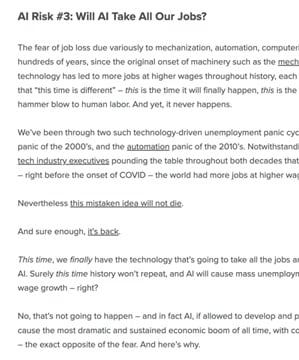Fear of Job Loss
Sources:
The fear of losing a job, especially to automation or technological changes, is a longstanding and pervasive concern. , a Nobel Laureate and economics professor, explores this in his discussion about the historical narrative surrounding automation. He explains that fears of automation and job loss have been around for over 2000 years, tracing back to ancient times with Aristotle and moving through history to the Luddites and beyond. Today, this narrative often revolves around modern terms like artificial intelligence and machine learning. Shiller notes that while the fear narrative is contagious, the competing narrative that automation could lead to better jobs and a richer society has always been present but is less sensational and thereby less discussed 1.
Additionally, the role of fear in framing public discourse on job loss due to AI has been analyzed by commentators like who acknowledges that every major introduction of new technology historically has led to greater job creation and higher wages, despite recurring cycles of panic 2.
Moreover, argues that while AI will result in some job losses, the impact might be more pronounced in countries that host outsourced tasks. He suggests that the U.S., having already outsourced many low-end jobs, might see less impact compared to countries like India and China where factory work and customer support—the jobs most susceptible to early automation—predominate 3.
Understanding these expert insights can help contextualize the fear of job loss and suggest that while the fear is not unfounded, historical patterns and the evolving nature of work often balance out the initial negative impacts of technological advancements.
RELATED QUESTIONS
